Governor: Use of Minnesota's temporary morgue not 'imminent'

PPE piled up in the state of Minnesota's temporary morgue.
(FOX 9) - After the Minnesota Department of Public Safety confirmed state officials were preparing an overflow morgue space in St. Paul to potentially store human remains, Gov. Tim Walz explained there is no immediate need for the space, but stands by the purchase of the facility as an “insurance” measure.
“It’s not that there’s an imminent use of using it, it’s just that it’s there and it’s ready to go,” Gov. Walz said.

Governor says use of Minnesota’s temporary morgue not imminent
After the Minnesota Department of Public Safety confirmed state officials were preparing an overflow morgue space in St. Paul to potentially store human remains, Gov. Tim Walz explained there is no immediate need for the space, but stands by the purchase of the facility as an “insurance” measure.
Gov. Walz said morgues, funeral homes and medical examiner facilities are currently at about 60 percent capacity.
Some funeral directors say, storage capacity was a bigger concern in the spring, when there were strict public gathering guidelines and many families were choosing to delay funeral services.
“We were running pretty close to capacity a couple times in the spring with the number of deaths and people that were delaying services but that cleared up once they started to realize the pandemic was going to be a long standing event,” funeral director at Gearty Delmore Funeral Chapels and board member of the Minnesota Funeral Directors Association Scott Benson said.
Benson says his funeral home can serve 20 to 35 families at a time. Right now they are serving 10, so capacity is not an issue he’s worried about in the near future, but says he understands why there is a backup plan in place.
With new gathering restrictions in place until at least mid-December, families could start choosing to delay services again. Current Minnesota restrictions say funeral homes can only be at half capacity, and besides a service, there can be no other gathering or interaction.
“We can’t serve coffee, we can’t have a drinking fountain, it’s just a lot of changes,” funeral director and owner of Johnson Peterson Funeral Homes, Ken Peterson said.
As of now, Peterson and Benson said they don’t foresee the stat needing the overflow storage space unless there is a dramatic, prolonged increase in the number of deaths in the state.
Benson said rural areas, that may have fewer funeral homes, could be impacted more severely.

